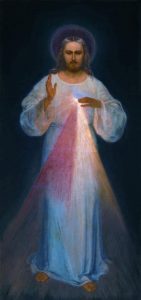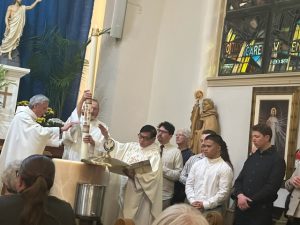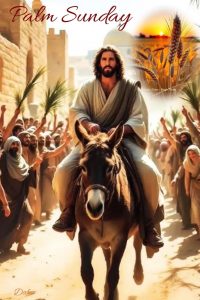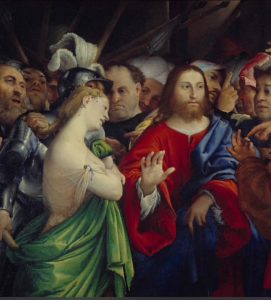Early in the morning after Easter Sunday, Pope Francis returned to God with his total dedication of service to the Church and love for God. We are in mourning and yet rejoicing in the spirit of Easter, where Jesus conquers death and evil by the power of His resurrection. Jesus gives hope to us by His triumph in order to defeat evil and confirm our faith through His rising from death to Life.
For those who believe and are faithful, death is not an end but a beginning of eternal life with God. It is a hope that someday we will see God face to face and share in His everlasting glory. Though Pope Francis (2013-2025) succumbed to physical death, he would be rewarded with God’s mercy. He was a good shepherd and a Vicar of Christ. Pope Francis, a leader known for steering the Catholic Church toward mercy and care for the marginalized, because of his idea of the Church being as a “hospital for the sick” and so everyone is welcome. He wanted the Church not to forget those in the “peripheries,” meaning calling our attention to care for those poor, living in far-flung areas, neglected and forgotten people in our society. This is what Jesus Christ needs for His Church to feel more present in the halls of power, as viewed through Pope Francis’ personal experience as an important role in the Church today.
Today, we are celebrating the second Sunday of Easter, which is known as Divine Mercy Sunday. This devotion was started by St. Faustina, who received private and personal revelation from Jesus and through the help of St. John Paul II who proclaimed the 2nd Sunday after Easter as the feast of the Divine Mercy. It was not about knowing God, but what is essential is our encounter with Jesus, the living Lord, who loves us personally and shares His glory with us even in this present moment.
In the first reading, taken from the Acts of the Apostles, we hear about the many signs and wonders wrought by the apostles that attracted many new members and added to their number, and early community grew tremendously. Many defy death and are even healed by the working of the Holy Spirit through the apostles, in particular, Peter’s boldness to preach and the other apostles being aided by the power of the Holy Spirit. We also heard about a couple named, Ananias and Safira who donated a portion and yet were holding back money from the community but then were reminded by the words of Peter.
The second reading from the book of Revelation tells us about the vision that John had of an encounter with the glorified and risen Jesus. St. John acknowledges that “once I was dead, but now I am alive forever and ever.” It means that his encounter with the resurrected Jesus allows him to become dead to self and then consequently be a spirit-filled person ready to face the Lord’s glory.
The gospel is taken from the evangelist St. John. This gospel is familiar to us because it was about Thomas, who had not seen Jesus when He first appeared to His apostles; then on the second time Jesus appeared, Thomas was invited to touch the wounds of Jesus in order to believe. I believe this is the key element of John’s gospel for anyone to come and to be touched by the power of the Lord Jesus Christ. It is true that we have continuously heard stories of miracles of healing, signs, works and preaching, but like Thomas, we were simply absent from Jesus’ presence or not fully believing because we have not seen or have just heard through the gospels. Thus, many Thomases appeared in the world.
Reflecting on this gospel passage, how do we change our views and strengthen our faith in the Resurrection of our Lord? St. Paul reminds us that in our preaching, our life becomes empty if we don’t believe in Christ’s resurrection. The resurrection is the very heart of our Faith in Jesus Christ, our God and Savior.
First, Jesus appears to the frightened apostles without Thomas. Maybe he was an outsider because of his personality. That is why he is called Thomas, the Didymus. Didymus means twin and may be called twin due to his “bipolar personality.” He is always alone and has difficulty being with others. Because of personality issues, he is not very much accepted by his fellow apostles. He said, “Unless I see the mark of the nails in his hands and put my finger into the nail marks and put my hand into his side, I will not believe.” The second time Jesus appeared, Thomas was present with the group of apostles, and Jesus invited him saying, “Put your finger here and see my hands, and bring your hand and put it into my side and do not be unbelieving but believe.” Thomas responded, “My Lord and My God.” If we analyze well, the issue is not about the unbelief towards Jesus but simply Thomas refused to believe the testimony of his fellow Apostles. We cannot stereotype Thomas as “Doubting,” because he believes in the Resurrection of Jesus with his profound confession. He wanted to see more of Jesus rather than hearing it from his companions.
Second, Jesus upon seeing his apostles, said to them twice, “Peace be with you.” The apostles’ fears, shames and doubts separated them. They temporarily abandoned their Teacher, and the sending of the Holy Spirit upon them strengthens them together and grants to them healing, forgiveness and the power to forgive as well. Jesus allows them to believe in a different way of seeing beyond, what can blind us and miss our focus.
St. John’s gospel teaches us with this beautiful conclusion, “Jesus did many other signs in the presence of His disciples that are not written in this book, but these are written that you may come to believe that Jesus is the Christ, the Son of God and that through this belief you may have life name.” (v.30) For those who are struggling to live faithfully and lovingly hopeful by going out and being sent, then just believe that the gift of the Holy Spirit leads you to a graceful success, like the eleven apostles who labored much to be true witnesses of His resurrection. We are sent to attract others for Christ.
“Blessed are those who have not seen and have believed.“ May this feast of the Divine Mercy grant us the grace to be merciful too. Alleluia.
Fr. Arlon, osa
—————-
El Dictado del Corazón
Segundo Domingo de Pascua (Domingo de la Divina Misericordia)
- Hechos 5,12-16
- Salmo 117,2-4.13-15.22-23
- Apocalipsis 1,9-11a.12-13.17-19
- Juan 20,19-31
En la mañana siguiente al Domingo de Pascua, el Papa Francisco regresó a Dios, habiendo entregado su vida en total dedicación al servicio de la Iglesia y en amor a Dios. Nos encontramos en un tiempo de duelo y de alegría—de duelo porque hemos perdido a un pastor, y de alegría porque, a la luz de la Pascua, sabemos que Cristo ha vencido a la muerte y al mal por el poder de Su resurrección. Su victoria nos trae esperanza: la certeza de que el mal no tiene la última palabra, y la confirmación de nuestra fe mediante Su paso de la muerte a la vida.
Para los que creen y permanecen fieles, la muerte no es un final sino un comienzo—una entrada a la vida eterna con Dios. Tenemos la esperanza de que, un día, veremos a Dios cara a cara y compartiremos Su gloria eterna. Aunque el Papa Francisco (2013–2025) ha partido de esta vida, lo encomendamos a la infinita misericordia de Dios. Fue un buen pastor, un verdadero Vicario de Cristo. Conocido por su profunda compasión y su cercanía a los marginados, veía a la Iglesia como un “hospital de campaña,” un lugar donde todos son bienvenidos. Nos retó a no olvidar las “periferias”: los pobres, los olvidados, los abandonados, y los que viven lejos de los centros de poder. En esto, encarnó lo que Cristo desea de Su Iglesia: una presencia no sólo en el santuario, sino en medio del pueblo.
Hoy celebramos el Segundo Domingo de Pascua, también conocido como el Domingo de la Divina Misericordia—una devoción que comenzó con las visiones de Santa Faustina, quien recibió revelaciones privadas de Jesús, y que fue establecida por San Juan Pablo II, quien declaró este domingo como la Fiesta de la Divina Misericordia. Esta devoción no se trata sólo de conocer a Dios intelectualmente, sino de encontrarse con el Señor Resucitado—Jesús que nos ama de manera personal y comparte Su gloria con nosotros, incluso ahora.
En la primera lectura de los Hechos de los Apóstoles, escuchamos sobre los muchos signos y prodigios realizados por los apóstoles, los cuales atrajeron a innumerables personas a la fe. La comunidad cristiana primitiva creció rápidamente. La predicación valiente de Pedro y los demás apóstoles, fortalecida por el Espíritu Santo, trajo sanación y esperanza. También recordamos la historia de Ananías y Safira, quienes fueron confrontados por Pedro por retener parte de su ofrenda, recordándonos la importancia de la integridad en nuestro caminar de fe.
La segunda lectura, del libro del Apocalipsis, narra la visión de Juan del Cristo glorificado y resucitado. Juan proclama: “Estuve muerto, pero ahora estoy vivo por los siglos de los siglos.” Su encuentro con el Señor Resucitado lo transformó—murió a sí mismo y se hizo plenamente vivo en el Espíritu, listo para ser testigo de la gloria de Dios.
En el Evangelio, volvemos a escuchar la conocida historia del “Tomás incrédulo.” Cuando Jesús se apareció por primera vez a los apóstoles, Tomás no estaba con ellos. Al escuchar su testimonio, declaró que no creería a menos que pudiera ver y tocar las heridas de Cristo. Cuando Jesús se apareció nuevamente, lo invitó a hacer precisamente eso. Tomás respondió con una confesión profunda: “¡Señor mío y Dios mío!”
Este momento es clave en el Evangelio de Juan. No es simplemente una historia sobre la duda, sino sobre el encuentro personal. Como Tomás, muchos de nosotros deseamos ver y tocar antes de creer. Podemos haber escuchado historias de milagros y testimonios, y aun así luchamos por confiar en lo que no hemos experimentado directamente. En ese sentido, el mundo está lleno de muchos “Tomases.”
Pero veamos más a fondo. El problema de Tomás no era simplemente su incredulidad en Jesús—era una resistencia a confiar en el testimonio de sus hermanos apóstoles. Necesitaba encontrar a Cristo por sí mismo. No debemos etiquetarlo simplemente como un “incrédulo.” Más bien, representa a aquellos entre nosotros que anhelan una experiencia de Dios más íntima y tangible. Y cuando ese momento llegó, su fe superó la de los demás al proclamar: “¡Señor mío y Dios mío!”
Consideremos también que cuando Jesús se apareció por primera vez a los apóstoles, les dijo: “La paz esté con ustedes”—no una, sino dos veces. Eran hombres cargados de miedo, vergüenza y confusión. Habían abandonado a su Maestro. Sin embargo, Cristo no los encontró con condena, sino con paz, sanación, perdón y el don del Espíritu Santo. A través del Espíritu, les dio poder para perdonar y para salir como testigos Suyos.
El Evangelio de Juan concluye con estas palabras: “Jesús realizó muchos otros signos en presencia de sus discípulos que no están escritos en este libro. Pero estos han sido escritos para que ustedes crean que Jesús es el Cristo, el Hijo de Dios, y para que creyendo, tengan vida en su nombre” (Juan 20,30-31).
Para aquellos de nosotros que luchamos por permanecer fieles, que nos esforzamos por vivir con amor y esperanza—crean esto: el Espíritu Santo los guiará. Como los apóstoles, también nosotros somos enviados a ser testigos de la Resurrección, atrayendo a otros a Cristo no sólo con palabras, sino con nuestras vidas.
“Dichosos los que creen sin haber visto.”
Que esta Fiesta de la Divina Misericordia abra nuestros corazones a la misericordia de Dios y nos inspire a extender esa misma misericordia a los demás.
Aleluya.
P. Arlon, O.S.A.




